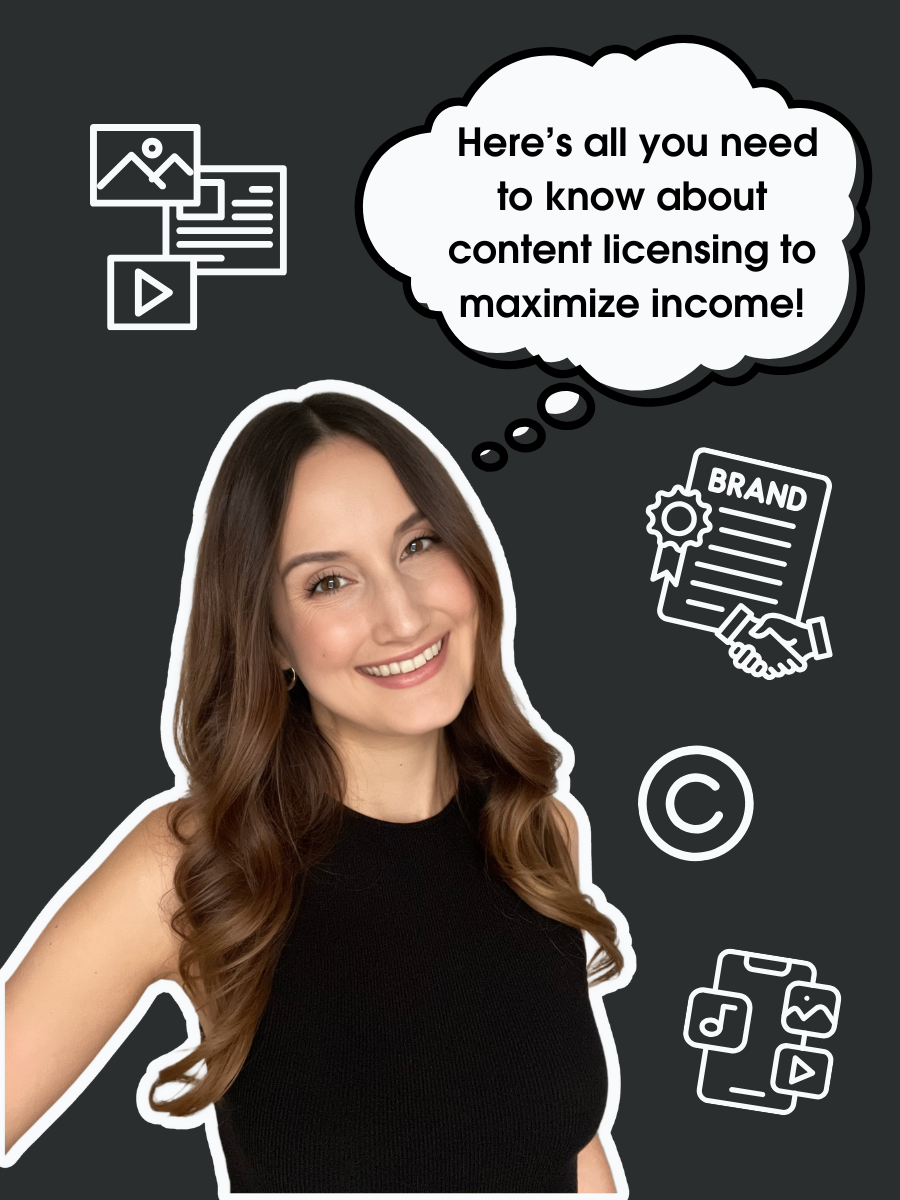How to Use Content Licensing as a Creator: 3 Licensing Types Explained (+ Real Examples & Pricing Tips)
Ever had a brand reuse your content everywhere — from Instagram ads to their website — without paying extra? That’s what happens when creators don’t fully understand content licensing.
Most creators confuse exclusive, sole, and non-exclusive licenses and don’t know what to charge for content licensing — and that can cost you thousands in lost income or even limit how you use your own work.
That’s why I’m sharing exactly what types of licenses to use, content licensing fees to charge, and real content licensing examples for creators. Once you know the difference, you can use content licensing to protect your creativity and maximize your earnings.
👉 And if you want a ready-made contract that covers it all, my Content Licensing Agreement Template makes it crystal clear what rights are granted (and what aren’t) — so you stay in control of your content.
This post is all about the 3 key types of content licensing every creator must master to protect their work, earn more, and confidently handle every deal.
Content Licensing for Creators
The 3 Types of Content Licenses (+ Practical Content Licensing Examples)
Exclusive Content Licensing – The “All Yours, Not Mine” Deal
An exclusive content license means only the licensee (the person receiving the license) can use the rights — not you, not anyone else.
Even though you still own the content, you can’t post or repurpose it yourself unless those rights are spelled out in your contract.
📌 Exclusive Content Licensing Example: A brand buys exclusive rights to your TikTok ad for their product launch. That means you can’t reuse the video on your own platforms unless it’s clearly stated in the agreement.
💥 What Could Go Wrong: “But I still own the video, so I can post it too, right?” → Actually, no. Unless you’ve written exceptions into the contract, you’re locked out of your own content.
Because of that risk, not every contract template in my Contract Shop even allows for exclusivity:
Content Licensing Agreement Template (Bundle): The licensee-friendly version (for when you are receiving rights) includes exclusivity as an option. The licensor-friendly version (for when you are granting rights) leaves exclusivity out — so you always keep the right to use your own work.
Brand Sponsorship Agreement: Designed for content you post on your own channels. It includes a sole license as the only content licensing option, so you and the brand can both use the content (with usage fees for the brand).
UGC Contract Template: Used when you create content for a brand to use on their platforms. This one does include exclusivity as one of the content licensing options — but it also carves out your right to use the content for your portfolio and social media.
Sole Content Licensing – The “We Both Use It” Deal
A sole content license means both you (the creator) and the licensee (the brand or client) can use the content — but no one else. With this type of content licensing, the brand gets exclusivity against third parties, but you keep your own usage rights.
📌 Sole Content Licensing Example: You license a workout video to a supplement brand. The brand can repost it on their platforms, but you can also keep using it on your own channels.
💥 What Could Go Wrong: Without clear terms, brands sometimes assume “sole” means “exclusive.” That can lead to disputes if they see you using the same content.
Here’s how it works in my contract templates:
Content Licensing Agreement Template (Bundle): Both the licensor-friendly and licensee-friendly versions include the option for a sole license, making it clear that both sides can use the content.
Brand Sponsorship Agreement: Grants brands a sole license to repost your sponsored content. You still own it and keep posting rights, but they get usage rights for the platforms and purposes you agree on.
UGC Contract Template: Includes the option for a sole license, too. This is often the best fit when a brand wants strong rights to use your deliverables — but you also want to showcase the work without any restrictions.
Non-Exclusive Content Licensing – The “Share With Many” Deal
A non-exclusive content license means you can license the same content to multiple brands or clients while still using it yourself. No one gets exclusivity — everyone you license to can use the content at the same time.
📌 Non-Exclusive Content Licensing Example: You sell the same stock photo to several bloggers or allow multiple small businesses to use your eBook. Everyone gets access, but no one gets special treatment.
💥 What Could Go Wrong: If you don’t spell it out, a client might assume they’re the only one with rights — and feel cheated when they see others using the same content.
Here’s how it works in my contract templates:
Content Licensing Agreement Template (Bundle): Both versions include a non-exclusive license option. This is perfect for licensing out photos, videos, or other content to multiple buyers.
UGC Contract Template: Includes non-exclusive licensing, though it’s less common for brand deals (brands usually want sole or exclusive). Still useful if you want to allow a brand limited rights while keeping full flexibility.
Digital Product Terms & Conditions: For products like eBooks, courses, or guides, this template makes it clear that buyers only get a non-exclusive, personal-use license — no reselling or sharing.
How to Price Content Licensing Fees
Understanding the types of licenses is one thing — but knowing how to charge for them is where most creators leave money on the table. Your content licensing fees should reflect not just the work you created, but also how, where, and for how long a brand gets to use it.
Common pricing models
Flat Fee → A one-time payment for a defined use (e.g., Instagram and website for 3 months). Simple and predictable.
Royalties → Ongoing payments tied to sales or revenue generated from your content. Great for creators with high-converting content.
Hybrid Models → A flat fee for initial use, plus renewal or ad-use add-ons if the brand wants extended rights.
What affects your fee
✅ Exclusivity (exclusive > sole > non-exclusive)
✅ Duration (3 months vs. 12 months)
✅ Territory (local vs. global rights)
✅ Media & Placements (organic posts vs. paid ads, TV, print)
✅ Whitelisting / Ads (when a brand runs ads through your handle)
✅ Brand Size (a local boutique vs. a global corporation)
Example: Same content, different content licensing fees
Non-Exclusive License: $500 for a recipe video that you allow a brand to repost on Instagram alongside others.
Sole License: $1,500 for the same video if the brand wants to be the only one (besides you) who can use it.
Exclusive License: $3,000+ if the brand wants to be the only one using it, even restricting you from reposting it yourself during the license term.
👉 Pro Tip: My Content Licensing Agreement Template includes flat fee, royalty, and renewal language — so you can confidently set the right price without underselling your work.
Which Content Licensing Agreement Template Do You Need?
Protect your work and get paid fairly by using the right contract for the right situation:
📄 Content Licensing Agreement Template (Bundle): Best for licensing existing content (photos, videos, articles) to brands or other creators. Includes both licensor- and licensee-friendly versions.
🎥 UGC Contract Template: Best for creating content a brand will post on their platforms. Includes exclusive, sole, and non-exclusive content licensing options — with carve-outs for your portfolio.
📢 Brand Sponsorship Agreement: Best for sponsored posts you publish on your own channels. Grants the brand a sole license to repost within agreed limits.
📚 Digital Product Terms & Conditions: Best for selling eBooks, courses, or downloads. Makes it clear that buyers only get a non-exclusive, personal-use license.
👉 Ready to lock in the right content licensing rights? Shop my contract templates here »
Why You Need the Right Content Licensing Agreement
Mastering exclusive, sole, and non-exclusive licenses isn’t just legal jargon — it’s how you stay in control of your content, protect your creative freedom, and make sure you’re charging what your work is truly worth.
When you know which license type to use, you avoid messy disputes, prevent underpricing, and build more professional relationships with brands and clients.
👉 Ready to put it into practice? My contract templates give you the exact wording you need to:
✅ Choose between exclusive, sole, or non-exclusive rights
✅ Define usage limits (purpose, platforms, ads, territories, duration)
✅ Set renewal fees or royalties so you don’t leave money on the table
✅ Protect your portfolio use and prevent misuse of your work
🔗 Get the Content Licensing Agreement Bundle here »
And if you’re creating new content for brands, check out:
🎥 UGC Contract Template (for content brands post on their channels)
📢 Brand Sponsorship Agreement (for sponsored posts on your own platforms)
📚 Digital Product Terms & Conditions (for selling eBooks, courses, or downloads)
This post was all about how to use content licensing as a creator — so you can protect your work, charge with confidence, and grow your income.
Learn about the key basics of content licensing:








